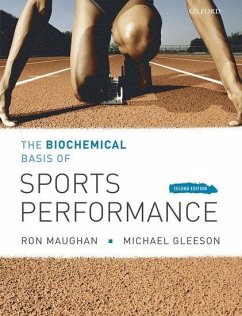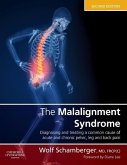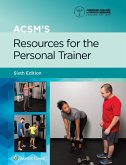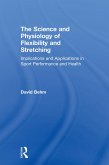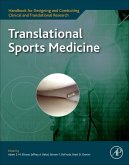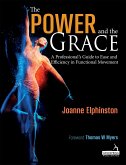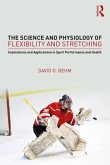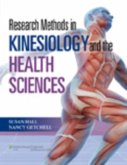Ronald J. Maughan (School of Sport and Loughbo Exercise Sciences, Michael Gleeson (School of Sport and Loughboro Exercise Sciences
The Biochemical Basis of Sports Performance
Ronald J. Maughan (School of Sport and Loughbo Exercise Sciences, Michael Gleeson (School of Sport and Loughboro Exercise Sciences
The Biochemical Basis of Sports Performance
- Broschiertes Buch
- Merkliste
- Auf die Merkliste
- Bewerten Bewerten
- Teilen
- Produkt teilen
- Produkterinnerung
- Produkterinnerung
Introduces the student of sports science or exercise physiology to the biochemical processes that underpin exercise performance and the adaptations that occur with training. The principles of exercise biochemistry are introduced in a context that is immediately relevant to the student of sports science.
Andere Kunden interessierten sich auch für
![The Malalignment Syndrome The Malalignment Syndrome]() Wolf Schamberger (Department of Medic Clinical Associate ProfessorThe Malalignment Syndrome91,99 €
Wolf Schamberger (Department of Medic Clinical Associate ProfessorThe Malalignment Syndrome91,99 €![ACSM's Resources for the Personal Trainer ACSM's Resources for the Personal Trainer]() Trent HargensACSM's Resources for the Personal Trainer87,99 €
Trent HargensACSM's Resources for the Personal Trainer87,99 €![The Science and Physiology of Flexibility and Stretching The Science and Physiology of Flexibility and Stretching]() David BehmThe Science and Physiology of Flexibility and Stretching196,99 €
David BehmThe Science and Physiology of Flexibility and Stretching196,99 €![Translational Sports Medicine Translational Sports Medicine]() Translational Sports Medicine170,99 €
Translational Sports Medicine170,99 €![The Power and the Grace The Power and the Grace]() Joanne ElphinstonThe Power and the Grace60,99 €
Joanne ElphinstonThe Power and the Grace60,99 €![The Science and Physiology of Flexibility and Stretching The Science and Physiology of Flexibility and Stretching]() David BehmThe Science and Physiology of Flexibility and Stretching58,99 €
David BehmThe Science and Physiology of Flexibility and Stretching58,99 €![Research Methods in Kinesiology and the Health Sciences Research Methods in Kinesiology and the Health Sciences]() Susan HallResearch Methods in Kinesiology and the Health Sciences108,99 €
Susan HallResearch Methods in Kinesiology and the Health Sciences108,99 €-
-
-
Introduces the student of sports science or exercise physiology to the biochemical processes that underpin exercise performance and the adaptations that occur with training. The principles of exercise biochemistry are introduced in a context that is immediately relevant to the student of sports science.
Hinweis: Dieser Artikel kann nur an eine deutsche Lieferadresse ausgeliefert werden.
Hinweis: Dieser Artikel kann nur an eine deutsche Lieferadresse ausgeliefert werden.
Produktdetails
- Produktdetails
- Verlag: Oxford University Press
- 2 Revised edition
- Seitenzahl: 336
- Erscheinungstermin: 20. Mai 2010
- Englisch
- Abmessung: 245mm x 189mm x 19mm
- Gewicht: 590g
- ISBN-13: 9780199208289
- ISBN-10: 019920828X
- Artikelnr.: 28949256
- Herstellerkennzeichnung
- Libri GmbH
- Europaallee 1
- 36244 Bad Hersfeld
- gpsr@libri.de
- Verlag: Oxford University Press
- 2 Revised edition
- Seitenzahl: 336
- Erscheinungstermin: 20. Mai 2010
- Englisch
- Abmessung: 245mm x 189mm x 19mm
- Gewicht: 590g
- ISBN-13: 9780199208289
- ISBN-10: 019920828X
- Artikelnr.: 28949256
- Herstellerkennzeichnung
- Libri GmbH
- Europaallee 1
- 36244 Bad Hersfeld
- gpsr@libri.de
Michael Gleeson is Professor of Exercise Biochemistry, and Ronald Maughan is Professor of Sport and Exercise Nutrition, both at the School of Sport and Exercise Sciences, Loughborough University, UK
Preface
Introduction: The biochemical basis of exercise and sport
Learning Objectives
Introduction
Historical perspective
Evolution of records
The appliance of science
The abuse of science
Key points
The Weightlifter
Learning Objectives
Introduction
Muscle structure and function
Proteins: structural and functional characteristics
Proteins as enzymes
Energy for muscle contraction
Nutritional effects on strength training and performance
Key points
Selected further reading
The Sprinter
Learning Objectives
Introduction
Anaerobic metabolism
Metabolic response to very high intensity exercise
Loss of adenine nucleotides
The cellular energy charge and the adenylate pool
Causes of fatigue in sprinting
Post-exercise recovery: the resynthesis of phosphocreatine
Nutritional effects on sprint performance
Key Points
Selected further reading
Middle Distance Events
Learning Objectives
Introduction
Energy and oxygen cost of middle distance runnning
Glycolysis
The glycolytic pathway
Oxidative metabolism of carbohydrate
Fatigue mechanisms in middle distance events
Recovery after exercise
Nutritional effects on the performance of the middle distance athlete
Key points
Selected further reading
The endurance athlete
Learning objectives
Introduction
Energy supply
Aerobic power
Fractional utilization of aerobic capacity
Energy metabolism
Integration and regulation of fuel use
Fatigue in prolonged exercise
The role of the brain in fatigue
Nutrition and endurance exercise performance
Key points
Selected Further reading
The Games Player
Learning Objectives
Introduction
Activity patterns and work rate in games play
Metabolic responses to intermittent high-intensity exercise
Fatigue in multiple sprint sports
Nutritional strategies for team sports athletes
Key points
Selected further reading
Sporting Talent: The genetic basis of athletic capability
Learning Objectives
Introduction; factors determining success in sport
The nature of genetic material
Principles of heredity
Gene doping: a realistic prospect?
Key points
Selected further reading
Adaptations to training
Learning Objectives
Introduction
Training strategies and the associated adaptations
Training for strength
Training for speed
Training for middle distance: increasing anaerobic capacity
Training for endurance: increasing aerobic capacity
Mechanisms and limitations to adaptation
Overreaching and overtraining
Exercise training, immune function, and susceptibility to infection
Effects of detraining
Nutritional effects on training adaptation
Free radicals and antioxidants
Key points
Selected further reading
Appendices
Key concepts in physical, organic and biological chemistry
Glossary of abbreviations and biochemical terminology
Units commonly used in biochemistry and physiology
Index
Introduction: The biochemical basis of exercise and sport
Learning Objectives
Introduction
Historical perspective
Evolution of records
The appliance of science
The abuse of science
Key points
The Weightlifter
Learning Objectives
Introduction
Muscle structure and function
Proteins: structural and functional characteristics
Proteins as enzymes
Energy for muscle contraction
Nutritional effects on strength training and performance
Key points
Selected further reading
The Sprinter
Learning Objectives
Introduction
Anaerobic metabolism
Metabolic response to very high intensity exercise
Loss of adenine nucleotides
The cellular energy charge and the adenylate pool
Causes of fatigue in sprinting
Post-exercise recovery: the resynthesis of phosphocreatine
Nutritional effects on sprint performance
Key Points
Selected further reading
Middle Distance Events
Learning Objectives
Introduction
Energy and oxygen cost of middle distance runnning
Glycolysis
The glycolytic pathway
Oxidative metabolism of carbohydrate
Fatigue mechanisms in middle distance events
Recovery after exercise
Nutritional effects on the performance of the middle distance athlete
Key points
Selected further reading
The endurance athlete
Learning objectives
Introduction
Energy supply
Aerobic power
Fractional utilization of aerobic capacity
Energy metabolism
Integration and regulation of fuel use
Fatigue in prolonged exercise
The role of the brain in fatigue
Nutrition and endurance exercise performance
Key points
Selected Further reading
The Games Player
Learning Objectives
Introduction
Activity patterns and work rate in games play
Metabolic responses to intermittent high-intensity exercise
Fatigue in multiple sprint sports
Nutritional strategies for team sports athletes
Key points
Selected further reading
Sporting Talent: The genetic basis of athletic capability
Learning Objectives
Introduction; factors determining success in sport
The nature of genetic material
Principles of heredity
Gene doping: a realistic prospect?
Key points
Selected further reading
Adaptations to training
Learning Objectives
Introduction
Training strategies and the associated adaptations
Training for strength
Training for speed
Training for middle distance: increasing anaerobic capacity
Training for endurance: increasing aerobic capacity
Mechanisms and limitations to adaptation
Overreaching and overtraining
Exercise training, immune function, and susceptibility to infection
Effects of detraining
Nutritional effects on training adaptation
Free radicals and antioxidants
Key points
Selected further reading
Appendices
Key concepts in physical, organic and biological chemistry
Glossary of abbreviations and biochemical terminology
Units commonly used in biochemistry and physiology
Index
Preface
Introduction: The biochemical basis of exercise and sport
Learning Objectives
Introduction
Historical perspective
Evolution of records
The appliance of science
The abuse of science
Key points
The Weightlifter
Learning Objectives
Introduction
Muscle structure and function
Proteins: structural and functional characteristics
Proteins as enzymes
Energy for muscle contraction
Nutritional effects on strength training and performance
Key points
Selected further reading
The Sprinter
Learning Objectives
Introduction
Anaerobic metabolism
Metabolic response to very high intensity exercise
Loss of adenine nucleotides
The cellular energy charge and the adenylate pool
Causes of fatigue in sprinting
Post-exercise recovery: the resynthesis of phosphocreatine
Nutritional effects on sprint performance
Key Points
Selected further reading
Middle Distance Events
Learning Objectives
Introduction
Energy and oxygen cost of middle distance runnning
Glycolysis
The glycolytic pathway
Oxidative metabolism of carbohydrate
Fatigue mechanisms in middle distance events
Recovery after exercise
Nutritional effects on the performance of the middle distance athlete
Key points
Selected further reading
The endurance athlete
Learning objectives
Introduction
Energy supply
Aerobic power
Fractional utilization of aerobic capacity
Energy metabolism
Integration and regulation of fuel use
Fatigue in prolonged exercise
The role of the brain in fatigue
Nutrition and endurance exercise performance
Key points
Selected Further reading
The Games Player
Learning Objectives
Introduction
Activity patterns and work rate in games play
Metabolic responses to intermittent high-intensity exercise
Fatigue in multiple sprint sports
Nutritional strategies for team sports athletes
Key points
Selected further reading
Sporting Talent: The genetic basis of athletic capability
Learning Objectives
Introduction; factors determining success in sport
The nature of genetic material
Principles of heredity
Gene doping: a realistic prospect?
Key points
Selected further reading
Adaptations to training
Learning Objectives
Introduction
Training strategies and the associated adaptations
Training for strength
Training for speed
Training for middle distance: increasing anaerobic capacity
Training for endurance: increasing aerobic capacity
Mechanisms and limitations to adaptation
Overreaching and overtraining
Exercise training, immune function, and susceptibility to infection
Effects of detraining
Nutritional effects on training adaptation
Free radicals and antioxidants
Key points
Selected further reading
Appendices
Key concepts in physical, organic and biological chemistry
Glossary of abbreviations and biochemical terminology
Units commonly used in biochemistry and physiology
Index
Introduction: The biochemical basis of exercise and sport
Learning Objectives
Introduction
Historical perspective
Evolution of records
The appliance of science
The abuse of science
Key points
The Weightlifter
Learning Objectives
Introduction
Muscle structure and function
Proteins: structural and functional characteristics
Proteins as enzymes
Energy for muscle contraction
Nutritional effects on strength training and performance
Key points
Selected further reading
The Sprinter
Learning Objectives
Introduction
Anaerobic metabolism
Metabolic response to very high intensity exercise
Loss of adenine nucleotides
The cellular energy charge and the adenylate pool
Causes of fatigue in sprinting
Post-exercise recovery: the resynthesis of phosphocreatine
Nutritional effects on sprint performance
Key Points
Selected further reading
Middle Distance Events
Learning Objectives
Introduction
Energy and oxygen cost of middle distance runnning
Glycolysis
The glycolytic pathway
Oxidative metabolism of carbohydrate
Fatigue mechanisms in middle distance events
Recovery after exercise
Nutritional effects on the performance of the middle distance athlete
Key points
Selected further reading
The endurance athlete
Learning objectives
Introduction
Energy supply
Aerobic power
Fractional utilization of aerobic capacity
Energy metabolism
Integration and regulation of fuel use
Fatigue in prolonged exercise
The role of the brain in fatigue
Nutrition and endurance exercise performance
Key points
Selected Further reading
The Games Player
Learning Objectives
Introduction
Activity patterns and work rate in games play
Metabolic responses to intermittent high-intensity exercise
Fatigue in multiple sprint sports
Nutritional strategies for team sports athletes
Key points
Selected further reading
Sporting Talent: The genetic basis of athletic capability
Learning Objectives
Introduction; factors determining success in sport
The nature of genetic material
Principles of heredity
Gene doping: a realistic prospect?
Key points
Selected further reading
Adaptations to training
Learning Objectives
Introduction
Training strategies and the associated adaptations
Training for strength
Training for speed
Training for middle distance: increasing anaerobic capacity
Training for endurance: increasing aerobic capacity
Mechanisms and limitations to adaptation
Overreaching and overtraining
Exercise training, immune function, and susceptibility to infection
Effects of detraining
Nutritional effects on training adaptation
Free radicals and antioxidants
Key points
Selected further reading
Appendices
Key concepts in physical, organic and biological chemistry
Glossary of abbreviations and biochemical terminology
Units commonly used in biochemistry and physiology
Index

